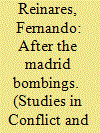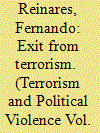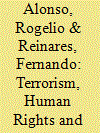|
|
|
Sort Order |
|
|
|
Items / Page
|
|
|
|
|
|
|
| Srl | Item |
| 1 |
ID:
088745


|
|
|
|
|
| Publication |
2009.
|
| Summary/Abstract |
Approaching the Madrid train bombings of 11 March 2004 from a security perspective, the occurrence of these highly lethal blasts made it evident not only a major intelligence failure, but also serious problems in the coordination between law enforcement agencies and deficiencies in international cooperation to prevent such deadly manifestations of global terrorism. As a result, governmental measures adopted in Spain immediately afterwards to reform the internal security structures and thus more adequately face the persisting risks and threats associated with that phenomenon, paid particular attention to increasing intelligence capabilities, advancing antiterrorist coordination and strengthening collaboration with relevant nations, alongside other initiatives aimed at preventing and countering al-Qaeda related terrorist activities. Overall, those measures enjoyed a high degree of legitimation among citizens
|
|
|
|
|
|
|
|
|
|
|
|
|
|
|
|
| 2 |
ID:
109143


|
|
|
|
|
| Publication |
2011.
|
| Summary/Abstract |
Terrorists disengage from the groups or organizations to which they belong as a result of structural, organizational, or personal factors. These types of factors seem to operate with relative mutual independence. All this can be analytically induced from research conducted at an individual level of analysis, based on 35 long interviews with former members of ETA who voluntarily decided to conclude their militancy at some point between 1970 and 2000. Until the mid-1980s, the individual decision to leave ETA tended to be linked to a subjective perception of ongoing political and social changes. From then on, disagreement with the internal functioning of the ethno-nationalist terrorist organization or the tactics adopted by its leaders became more salient motivations for those militants who decided to walk away. All along, however, there were ETA members who left terrorism behind for reasons of a rather personal nature. As expected, in this qualitative empirical study, disengagement was found to be a process seldom concomitant to that of deradicalization.
|
|
|
|
|
|
|
|
|
|
|
|
|
|
|
|
| 3 |
ID:
060488


|
|
|
|
|
| Publication |
Jan 2005.
|
| Summary/Abstract |
Terrorism systematically violates human rights and disrupts basic political processes common to liberal democracies. Combating terrorism is thus necessary in order to protect these fundamental rights and maintain the well functioning of tolerant polities. However, state initiatives put in place to cope with terrorism may also damage human rights, even when these measures are formulated by elected accountable authorities and implemented in the context of open societies. Spain has precisely been among those European countries most affected by the wave of terrorism initiated more than three decades ago across western industrial societies, and thus where violations of fundamental rights as well as obstacles to the exercise of civil liberties as a consequence of such violence became particularly severe. Also, a case where effective rule of law was temporarily damaged in the fight against the ethnonationalist terrorism perpetrated by ETA (an acronym for Euskadi ta Askatasuna, meaning Basque Homeland and Freedom) but successfully restored by efforts from both state institutions, as a result of an effective division of power, and civil society. It is therefore an experience providing substantive knowledge and valuable insights on how to counter terrorism in accordance with the principles and procedures of democracy. Accordingly, this paper aims at a better understanding on the interrelated issues of terrorism, human rights and law enforcement in a context of political change.
|
|
|
|
|
|
|
|
|
|
|
|
|
|
|
|
| 4 |
ID:
057613


|
|
|
|
|
| Publication |
Nov-Dec 2004.
|
|
|
|
|
|
|
|
|
|
|
|
|
|
|
|
|
|
|
|
|